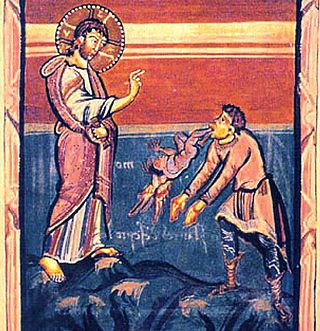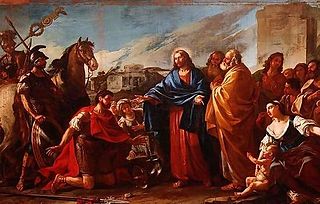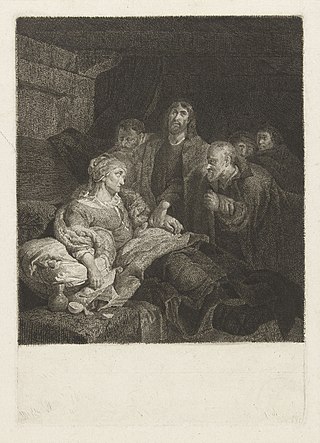
Matthew 3:11 is the eleventh verse of the third chapter of the Gospel of Matthew in the New Testament. The verse occurs in the section relating the preachings of John the Baptist. In this verse he predicts that he will be followed by someone much greater than himself. The main theme of this verse is that John will soon be supplanted by a much greater figure and that John's water baptism is just a preparation for the much greater baptism by fire and spirit that will occur under the second coming of the Christian messiah Jesus, an original Christian concept that, according to Jewish scholars, lacks any fundament in the Hebrew scripture.

Matthew 4:23 is the twenty-third verse of the fourth chapter of the Gospel of Matthew in the New Testament. Jesus has just recruited the first four disciples, this verse begins a brief summary of and introduction to Jesus' ministry in Galilee that will be recounted in the next several chapters.

Luke 7 is the seventh chapter of the Gospel of Luke in the New Testament of the Christian Bible. It tells the records of two great miracles performed by Jesus, his reply to John the Baptist's question, and the anointing by a sinful woman. The book containing this chapter is anonymous, but early Christian tradition uniformly affirmed that Luke the Evangelist, a companion of Paul the Apostle on his missionary journeys, composed this Gospel as well as the Acts of the Apostles.

Matthew 8:3 is the third verse of the eighth chapter of the Gospel of Matthew in the New Testament. This verse continues the miracle story of Jesus cleansing a leper, the first of a series of miracles in Matthew.

Matthew 8:5 is the fifth verse of the eighth chapter of the Gospel of Matthew in the New Testament. This verse begins the miracle story in which a centurion's servant is healed, the second of a series of miracles reported in Matthew.

Matthew 8:7 is the seventh verse of the eighth chapter of the Gospel of Matthew in the New Testament. This verse continues the miracle story of healing the centurion's servant, the second of a series of miracles in Matthew.

Matthew 8:6 is the sixth verse of the eighth chapter of the Gospel of Matthew in the New Testament. This verse continues the miracle story in which a centurion's servant is healed, the second of a series of miracles in Matthew.

Matthew 8:10 is the tenth verse of the eighth chapter of the Gospel of Matthew in the New Testament. This verse continues the miracle story of healing the centurion's servant, the second of a series of miracles in Matthew.
Matthew 8:9 is the ninth verse of the eighth chapter of the Gospel of Matthew in the New Testament. This verse continues the miracle story of healing the centurion's servant, the second of a series of miracles in Matthew.

Matthew 8:11 is the eleventh verse of the eighth chapter of the Gospel of Matthew in the New Testament. This verse is part of the miracle story of healing the centurion's servant, the second of a series of miracles in Matthew. After praising the Gentile Centurion's faith in the previous verse in this one Jesus prophesizes that many from around the world will follow him.
Matthew 9:22 is a verse in the ninth chapter of the Gospel of Matthew in the New Testament.

Matthew 9:18 is the 18th verse in the ninth chapter of the Gospel of Matthew in the New Testament.

Matthew 8:13 is the thirteenth verse of the eighth chapter of the Gospel of Matthew in the New Testament. This verse is the conclusion to the miracle story of healing the centurion's servant, the second of a series of miracles in Matthew.

Matthew 8:14 is the fourteenth verse of the eighth chapter of the Gospel of Matthew in the New Testament. This verse describes the start of Jesus healing Peter's mother-in-law.
Matthew 9:30 is a verse in the ninth chapter of the Gospel of Matthew in the New Testament.
Matthew 10:38 is a verse in the tenth chapter of the Gospel of Matthew in the New Testament.
Matthew 15:28 is a verse in the fifteenth chapter of the Gospel of Matthew in the New Testament.

Healing the centurion's servant is one of the miracles performed by Jesus of Nazareth as related in the Gospel of Matthew and the Gospel of Luke. The story is not recounted in the Gospels of either John or Mark.

The Exorcism of the Syrophoenician woman's daughter is one of the miracles of Jesus in the Gospels and is recounted in the Gospel of Mark in Chapter 7 and in the Gospel of Matthew in Chapter 15. In Matthew, the story is recounted as the healing of a Canaanite woman's daughter. According to both accounts, Jesus exorcised the woman's daughter whilst travelling in the region of Tyre and Sidon, on account of the faith shown by the woman.

Healing the royal official's son is one of the miracles of Jesus that appears in the Gospel of John. This episode takes place at Cana, though the royal official's son is some distance away, at Capernaum.













